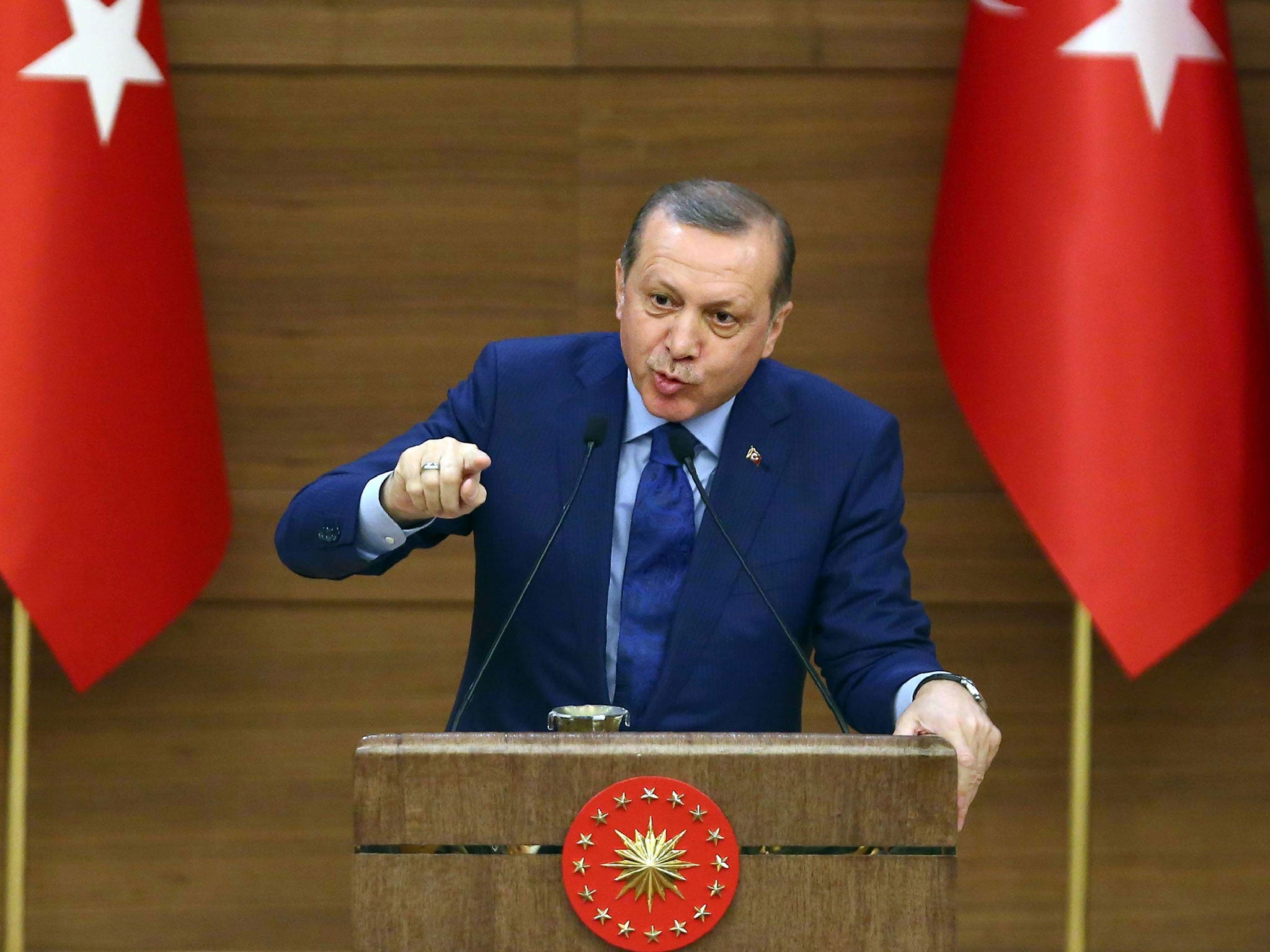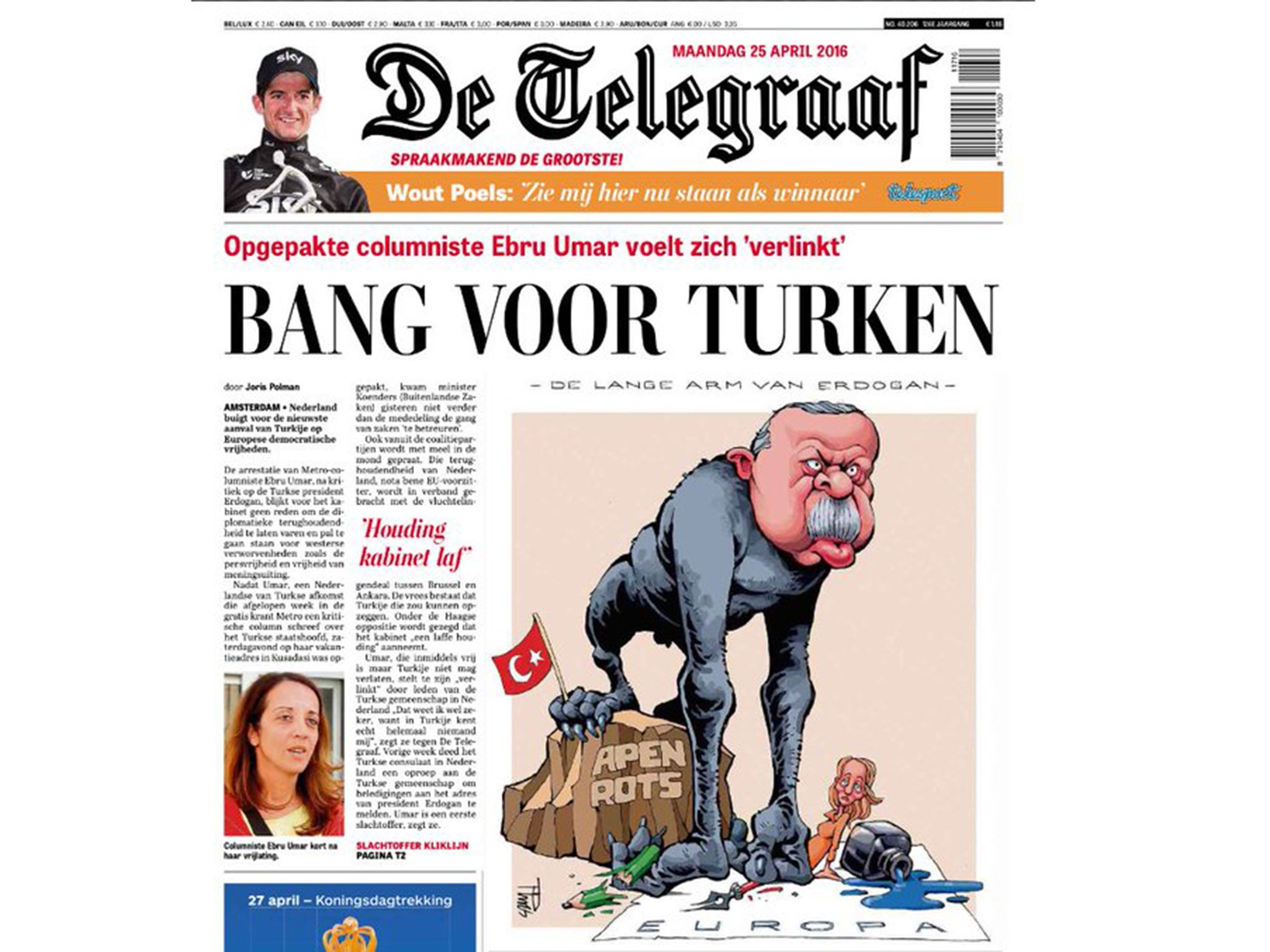Dutch newspaper publishes cartoon depicting Turkey’s Erdogan as an ape
The cartoon, published by the populist daily De Telegraaf, shows the Turkish President squashing free speech

Your support helps us to tell the story
From reproductive rights to climate change to Big Tech, The Independent is on the ground when the story is developing. Whether it's investigating the financials of Elon Musk's pro-Trump PAC or producing our latest documentary, 'The A Word', which shines a light on the American women fighting for reproductive rights, we know how important it is to parse out the facts from the messaging.
At such a critical moment in US history, we need reporters on the ground. Your donation allows us to keep sending journalists to speak to both sides of the story.
The Independent is trusted by Americans across the entire political spectrum. And unlike many other quality news outlets, we choose not to lock Americans out of our reporting and analysis with paywalls. We believe quality journalism should be available to everyone, paid for by those who can afford it.
Your support makes all the difference.After a Dutch journalist was arrested in Turkey this weekend for allegedly insulting President Recep Tayyip Erdogan, the most-read newspaper in the Netherlands on Monday published a front-page editorial cartoon that shows Erdogan as an ape, apparently crushing Europe's free speech.
The cartoon, published by the populist daily De Telegraaf, has an ape with Erdogan's face squashing a woman who appears to be Ebru Umar, the Dutch writer with a Turkish background who was arrested in Turkey on Sunday. In the cartoon, the Turkish president is standing on a rock labeled "Apenrots" — a Dutch term meaning "monkey rocks" that is used to refer to the Dutch Foreign Ministry but can also refer to a place where one dominant individual holds power.
The cartoon is titled "the long arm of Erdogan."
Umar, a columnist for the newspaper Metro, had been detained by Turkish authorities who were investigating tweets she had sent about Erdogan. Umar was released Sunday, but she says she has been ordered to remain in the country as the investigation proceeds.
The detention of Umar has added another layer to what many in the Netherlands think is a growing crackdown on free speech within Turkey — and outside its borders, too. Last week, the Turkish Consulate in Rotterdam came under fire after appearing to send an email that called for Turkish organizations in the Netherlands to report insults against Erdogan to it. The Turkish Embassy later said that the email had been poorly phrased and misunderstood, but it sparked controversy within the Netherlands, which is one of many European countries that still has "lèse-majesté" laws that prohibit insults against friendly heads of state.

Umar was among the critics of the consulate's email, writing in a column that the call to report insults was similar to "NSB practices," a reference to the Dutch branch of the Nazi Party during the World War II era. Sadet Karabulut, a Dutch politician of Kurdish descent, described the controversy as a sign of "Erdogan's long arm in the Netherlands."
The controversy isn't limited to the Netherlands. In Germany, Chancellor Angela Merkel recently announced that she would allow Jan Böhmermann, a comedian and writer known for his acerbic style, to be prosecuted for a poem he had read on German state television that accused Erdogan of bestiality, among other things. If convicted under Germany's own lèse-majesté law, Böhmermann could face up to three years in prison. The prosecution of Böhmermann has sparked a continent-wide backlash against Turkey, with one British magazine launching a competition for rude poems about Erdogan in response. Both Germany and the Netherlands have indicated that they plan to get rid of their lèse-majesté laws.
Erdogan has led Turkey for more than 13 years, first as prime minister and as president since 2014. He was once considered a modernizer by many in the West, but he has been accused of increasingly autocratic tendencies over the years. Since he became president, the government has used a previously rarely used law to prosecute about 2,000 people for allegedly insulting Turkey's head of state.
In tweets sent over the weekend, Dutch Prime Minister Mark Rutte said he was in touch with his Turkish counterpart, Ahmet Davutoglu, about Umar's detention. Rutte also added that the situation "touches directly on our core values of freedom of expression and press freedom."
Copyright: Washington Post
Join our commenting forum
Join thought-provoking conversations, follow other Independent readers and see their replies
Comments